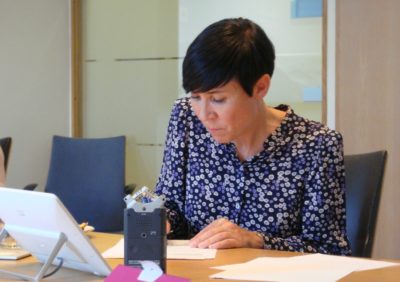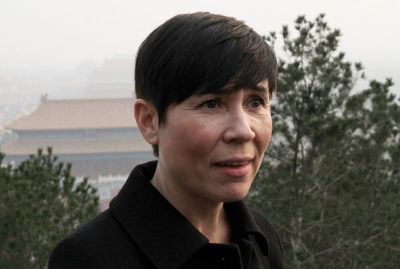After being seen as “terribly weak” in its relations with China, Norway has joined 26 other countries at the United Nations in challenging Chinese authorities’ new so-called “security law” for Hong Kong. They were all ignored, but their call to halt implementation of the law that cracks down on demonstrations in Hong Kong was a small triumph for human rights advocates who view China as the world’s new bully.

“We urged authorities in China and Hong Kong to reconsider putting the new security law into effect,” wrote Norwegian Foreign Minister Ine Eriksen Søreide in a statement to Norwegian Broadcasting (NRK) late Tuesday.
Søreide stated that all laws should be aimed at protecting citizens’ interests and security. “It is therefore important that the people’s views are reflected when new laws are implemented,” Søreide wrote, adding that “involving local authorities in combination with an open and inclusive dialogue with citizens is of vital importance.”
Instead it was China’s authoritarian leaders in Beijing who pushed through the new law in Hong Kong that severely restricts the right to demonstrate and can result in harsh prison terms for life. The law is widely viewed as Beijing’s tough response to all the recent pro-democracy demonstrations in Hong Kong that have erupted after Beijing has defied democracy in the once-thriving city. China has also been accused of violating its agreement with Great Britain when Hong Kong was handed over to China again in 1997.
The agreement called for Hong Kong to remain free and democratic under the banner of “one country-two systems,” but China’s communist government under authoritarian party leader Xi Jinping is not respecting those terms. Britain and many other countries have protested mightily, to no avail.
On Tuesday Norway joined Australia, Austria, Belgium, Belize, Canada, Denmark, Estonia, Finland, France, Iceland, Ireland, Germany, Japan, Latvia, Liechtenstein, Lithuania, Luxembourg, the Marshall Islands, the Netherlands, New Zealand, Palau, Slovakia, Slovenia, Sweden and Switzerland in calling on China to reverse implementation of the law on July 1. The US and Taiwan have also condemned the crackdown on opposition in Hong Kong, with the US withdrawing Hong Kong’s special status and halting exports of sensitive military equipment to Hong Kong. Taiwan’s President Tsai Ing-wen claimed Tuesday that Beijing “has broken its pledge to let Hong Kong maintain a high degree of autonomy for at least 50 years.”
Authorities in Beijing and those serving at their behest in Hong Kong instead moved forward with the restrictive law, and were thus behind the arrests of nearly 200 demonstrators by the end of its first day in effect. As the Hong Kong Police Force moved against anyone “participating in unauthorised assembles, disorderly conduct” or other alleged “offences,” Hong Kong’s disputed leader Carrie Lam hailed the law on the 23rd anniversary of the handover. She claims it “fills a hole” in national security.
One man reportedly was arrested for carrying a flag meant to symbolize independence for Hong Kong. Police used water canons and tear gas against demonstrators in the business district of Causeway Bay. Not only did the authorities ignore all international pleas to stop undermining self-determination in Hong Kong, they lashed back at their critics, essentially telling Norway and the rest of the world to mind its own business.

Norwegian Foreign Minister Søreide maintained that the law raises “cause for concern. We fear the new law will raise conflict levels and restrict civilian and political rights, and democracy in Hong Kong.”
Søreide added that the Norwegian government is also “extremely concerned about the human rights situation for the Uighurs and other minorities in Xinjiang (western China).” Norway and the other 26 countries urged that the UN’s High Commissioner for Human Rights be granted “unhindered access” to Xinjiang, in order to “report on the human rights situation.”
It’s as bold as the Norwegian government has publicly been since ending a diplomatic freeze with China in 2016. Human rights activists, commentators and opposition politicians in Norway have regularly chided the country’s Conservative government coalition for allegedly downplaying its own democratic principles in return for gaining market access to China. Anders Magnus, a former correspondent for NRK in China, remarked on NRK’s nightly national newscast just after the UN declaration on Tuesday that Norway has been forferdelig svak (terribly weak) in its dealings with China in recent years.
Now more Norwegian officials are speaking up. The outgoing leader of the Liberal Party (which shares government power with the Conservatives) recently suggested that Norway should suspend negotiations with China on a free-trade agreement. Newspaper Aftenposten reported earlier this month that both Trine Skei Grande and a veteran Member of Parliament, Michael Tetzschner of the Conservatives, are also keen to help lead a new international alliance of democratic countries called the Inter-Parliamentary Alliance on China (IPAC) that aims to mount a tougher united front in its meetings with China. Even NATO’s Secretary General Jens Stoltenberg, a former Norwegian prime minister, has said that China was boosting its “threats against open societies and individual freedoms,” and that he urged such societies to stand up against such “bullying” and force.
“We are worried for the world order when an authoritarian society with totalitarian tendencies wields greater global power,” Tetzschner told Aftenposten. He and others have especially reacted against threats made by China recently against Sweden. Other IPAC members include the US, Canada, Australia, Japan and EU countries.
NewsInEnglish.no/Nina Berglund

